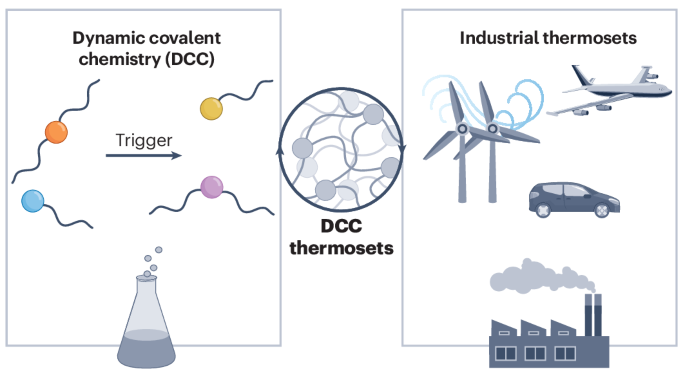Taking dynamic covalent chemistry out of the lab and into reprocessable industrial thermosets
IF 51.7
1区 化学
Q1 CHEMISTRY, MULTIDISCIPLINARY
引用次数: 0
Abstract
Dynamic covalent chemistry (DCC) allows the development of thermally (re)processable and recyclable polymer networks, which is a highly attractive feature for new generations of thermoset materials. However, despite a surge in academic interest wherein soon almost any imaginable DCC platform may have been applied in a thermoset formulation, dynamic or reversible covalent polymer networks have so far found only few industrial applications. This Review provides a perspective on the main strategies for the application of DCC in the design and development of bulk thermoset materials, and it presents some of the key hurdles for their industrial implementation. The polymer design strategies and associated chemistries are viewed from the perspective of how ‘close to market’ their development pathway is, thus providing a roadmap to achieve high-volume breakthrough applications. Ever-increasing society needs have made thermosets crucial, but their recycling poses considerable challenges. Dynamic covalent chemistry (DCC) offers a solution, and industry is ready for its implementation. On the basis of market proximity, three DCC-based strategies are proposed for stimulating industrial uptake of DCC-thermosets.


将动态共价化学带出实验室,进入可再处理的工业热固性
动态共价化学(DCC)允许开发热(再)加工和可回收的聚合物网络,这是新一代热固性材料的一个非常有吸引力的特征。然而,尽管学术兴趣激增,很快几乎任何可以想象的DCC平台都可以应用于热固性配方,但到目前为止,动态或可逆共价聚合物网络仅发现很少的工业应用。本文综述了DCC在块状热固性材料设计和开发中的主要应用策略,并提出了其工业实施的一些关键障碍。从聚合物设计策略和相关化学物质的开发路径如何“接近市场”的角度来看,从而为实现大批量突破性应用提供了路线图。
本文章由计算机程序翻译,如有差异,请以英文原文为准。
求助全文
约1分钟内获得全文
求助全文
来源期刊

Nature reviews. Chemistry
Chemical Engineering-General Chemical Engineering
CiteScore
52.80
自引率
0.80%
发文量
88
期刊介绍:
Nature Reviews Chemistry is an online-only journal that publishes Reviews, Perspectives, and Comments on various disciplines within chemistry. The Reviews aim to offer balanced and objective analyses of selected topics, providing clear descriptions of relevant scientific literature. The content is designed to be accessible to recent graduates in any chemistry-related discipline while also offering insights for principal investigators and industry-based research scientists. Additionally, Reviews should provide the authors' perspectives on future directions and opinions regarding the major challenges faced by researchers in the field.
 求助内容:
求助内容: 应助结果提醒方式:
应助结果提醒方式:


